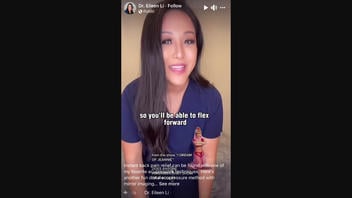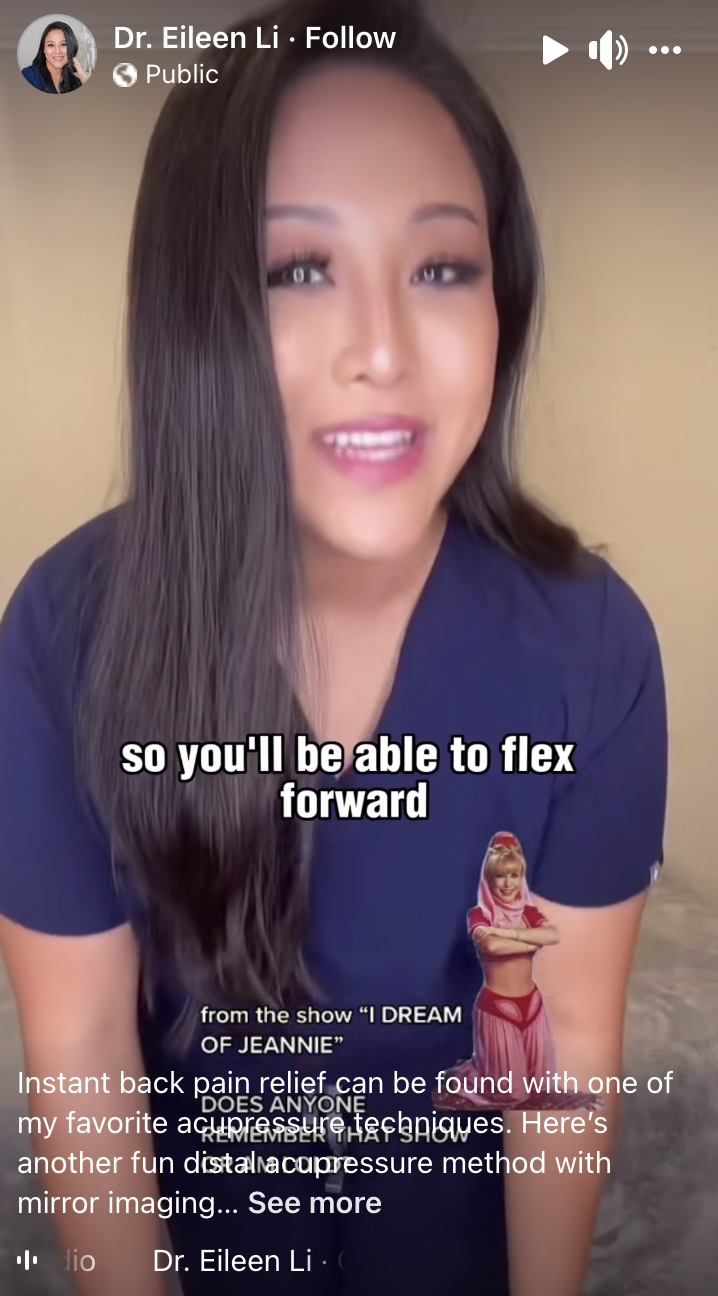STORY UPDATED: check for updates below.

Does pressing your elbows provide an effective treatment for relieving back pain? No, that's not true: There is no broadly accepted medical evidence to suggest that pressing the elbows through the use of acupressure or reflexology, the practices of pressuring certain supposed trigger points in the body to treat ailments, is an effective treatment for pain. Some research suggests that acupressure and reflexology may help to alleviate the symptoms of certain conditions, but not back pain. Experts note more limitations than proof in the existing research about the healing effects of these two techniques.
The claim about using elbow pressure for back pain appeared in a video, shared on Facebook on March 13, 2023. The captions read: "Instant back pain relief can be found with one of my favorite acupressure techniques." It continued:
Here's another fun distal acupressure technique method with mirror imaging
This is how the post appeared at the time of the writing of this fact check:
(Source: Facebook screenshot taken Tues March 14 13:31:44 UTC 2023)
The video was narrated by Eileen Li, a licensed acupuncturist who is listed in the National Certification Commission for Acupuncture and Oriental Medicine. The About section of her Facebook page also describes her as a Chinese herbalist, physical therapist, and "pain expert."
In the video posted on Facebook, Li claimed that applying thumb pressure three times to "the most tender spot in the crease" of an elbow "or right below it in the muscle area," for 30 seconds on each arm, "will help improve the blood flow to the lower back and also release muscle tension."
This concept is an alternative medicine technique known as acupressure, related to reflexology. Both acupressure and reflexology apply pressure along so-called energetic channels known as "meridians" throughout the body in order to stimulate energy flow. Like acupressure, reflexology is described by the National Center for Complementary and Integrative Health as a practice that uses different amounts of presure to specific parts of the body that match up with other parts of the body.
Lead Stories could find no conclusive evidence that acupressure or the related practice of reflexology are effective treatments for back pain.
In a March 23, 2023 email from Baylor College of Medicine, responding to Lead Stories' request for a medical opinion, Dr. Krishna Shah, a pain specialist, noted the lack of evidence and responded as follows to Li's claim that elbow pressure relieves lower back pain:
Larger studies are needed to determine the effectiveness of Acupressure for pain management. However, given its low cost, low risk, and easy to administer, I would recommend this for my patients with back pain as one of many treatment modalities to manage back pain symptoms. Elbow acupressure, which is LU5, has been used for lumbar pain.
Some limited evidence suggests that acupressure may help alleviate pain, but a 2010 review published in the Journal of Pain and Symptom Management found that the data quality was lacking, and that the "effectiveness for this treatment has not been conclusively demonstrated for any condition."
Similarly, an article published in the same journal in 2011 found that, out of 43 studies reviewed, report findings indicated a "significant likelihood of bias." While acupressure may be a useful strategy for managing some symptoms, the authors concluded that rigorous trials are needed to further solidify such claims.
A 2020 clinical trial published in the journal Aging and Mental Health that assessed the clinical effectiveness of acupressure on the management of depression in elderly patients found that although acupressure improved the mental state, "a placebo effect was evident." (In a placebo effect, patients mistake a dummy treatment for an actual treatment.)
Limited research and anectodal evidence also indicate that reflexology may alleviate the symptoms of certain conditions (multiple sclerosis and negative reactions to chemotherapy), but an August 2022 article published by the Cleveland Clinic objected that research touting the benefits of reflexology is generally low-quality and limited by small sample sizes, biases, and the placebo effect.
A 2011 review of research by the international journal Maturitas concluded that "the best clinical evidence does not demonstrate convincingly reflexology to be an effective treatment for any medical condition."
Lead Stories previously has reported that acupressure massages do not relieve asthma, that reflexology does not improve kidney function, and that self-massages do not cure infertility.
Updates:
-
2023-03-24T22:52:00Z 2023-03-24T22:52:00Z Updated to add the comments of Dr. Krishna Shah of Baylor College of Medicine.


















